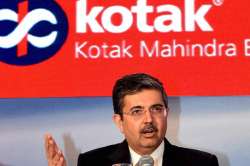Indian banks refusing to recognise full extent of bad loans, says Uday Kotak
New Delhi: Eminent banker Uday Kotak has blamed rival lenders of refusing to face up to the scale of the bad loan crisis. Kotak, one of the top private-sector banks has said that only half

New Delhi: Eminent banker Uday Kotak has blamed rival lenders of refusing to face up to the scale of the bad loan crisis. Kotak, one of the top private-sector banks has said that only half of the sector’s distressed assets have been publicly identified so far, despite a clear cut orders by the central bank.
The warning of sorts comes after RBI governor Raghuram Rajan revealed that he will leave when his current term expires in September. Notably, Rajan had spearheaded a massive drive to clear the balance sheets of Indian state-owned lenders of bad debts.
“The extent of the bad loans is significant and not fully recognised yet,” said Kotak, the managing director of Kotak Mahindra Bank.
“My view is that we are about halfway there,” he added.
Kotak also questioned whether nationalisation of banks served the purpose of checking uneven lending to big businesses, as most of the stress on their books is due to loans to big corporates.
The bank claims to be the country’s biggest buyer of stressed loans and says that it is struggling to find deals because banks are rejecting over the true value of their troubled assets.
Last September, the RBI had estimated that stressed assets, which include restructured and non-performing loans, are amounted to 14 per cent of assets at the state-controlled banks. This also account for about three-quarters of banking assets.
Kotak Mahindra, the country’s third-biggest non-state bank by market capitalisation stood at 2.1 per cent of its loan book at the end of March for the non-performing assets. This is far low than the 6.5 per cent reported by State Bank of India, which is the country’s biggest state-controlled lender, and 10 per cent at Bank of Baroda, the second-biggest.
Kotak further said, “The biggest challenge India faces today is getting our state-owned banks into shape.” He added, “There’s been too much kicking the can.”